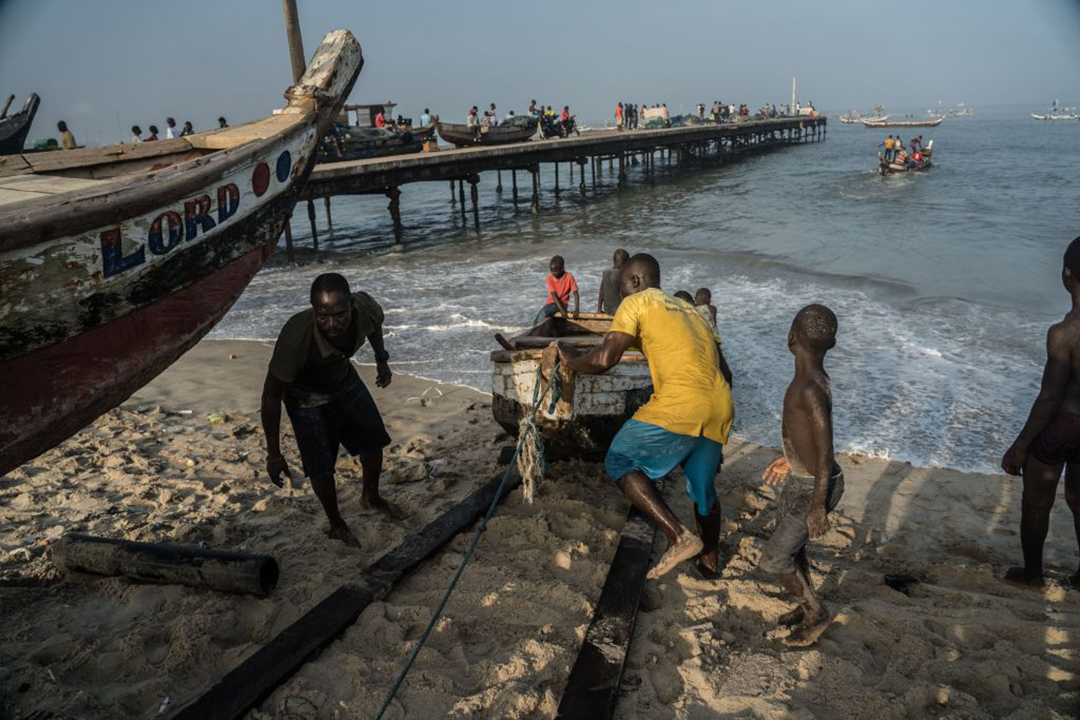Ghanaian Fisheries at Risk of Collapse, Experts Warn
ADF STAFF
A huge net swings across an industrial fishing trawler in Ghana. It opens, and the deck fills with a pile of glistening, silver-scaled fish.
The ship’s double-net system, which helps catch larger amounts of smaller fish, is illegal in Ghana, as is the presence of the foreign-owned vessel.
“Sometimes we select the biggest ones (fish) and label them,” said a Ghanaian fisherman who works on foreign trawlers and spoke anonymously to the Environmental Justice Foundation (EJF). “If we get 2,000 to 2,500 slabs, we call the canoes who collect them from the vessels.”
On industrial trawlers frozen fish are stacked in slabs to make them easily transportable.
The fisherman was describing saiko, the illegal transshipment of fish at sea. Saiko and other illegal, unreported and unregulated (IUU) fishing has steadily driven Ghana’s fish populations to the brink of collapse, threatening food security and the incomes of millions of people.
In August, the EJF released a report based on interviews with 215 small-scale fishermen, fish processors and traders, more than half of whom said they went without sufficient food over the past year. More than 70% of respondents also reported deteriorated living conditions, including a lack of access to clean water, over the past five years due to loss of income.
Analysts say there soon may be no more fish to catch.
Ghana’s small pelagic fish populations, such as sardinella, have dropped 80% in the past two decades. One species, sardinella aurita, already is fully collapsed. Without governmental intervention, full collapse of Ghana’s fisheries is likely in less than 10 years, Max Schmid, chief operating officer of EJF, told ADF.
As in other areas of West Africa, Ghanaian artisanal fishing boats are targeted by larger industrial trawlers. About 70% of those interviewed by EJF said industrial trawlers had damaged their fishing gear.
Ghana’s marine fisheries support more than 2.7 million people — almost 10% of the population. More than 100,000 fishermen and 11,000 canoes operate in the country, but average annual income has dropped up to 40% per artisanal canoe in the past 15 years or so, according to the EJF. An additional 500,000 Ghanaians work in fish processing, distribution and marketing.
The foreign trawlers mostly are owned by Chinese companies that illegally use Ghanaian front companies so they can fish. According to EJF, Chinese companies finance about 90% of industrial trawlers in the country.
Ghana has long struggled to properly police its waters.
The European Union in May issued Ghana a “yellow card” after concluding that the country’s level of development and engagement against IUU fishing was inadequate. A yellow card is a warning that sanctions may be imposed if the country does not improve efforts to halt IUU fishing.
Ghana responded by requiring companies operating there to reapply for fishing licenses to continue. The government also announced plans in mid-September to review licensing loopholes that let foreign fishing companies operate illegally.
In its report, EJF’s Chief Executive Officer Steve Trent urged Ghana’s government to adopt a “rights-based approach to fisheries management” that prioritizes the needs of small-scale fishing communities who “are often marginalized in decisions concerning their livelihoods.”
“Improving governance of the sector through enhanced transparency; ending illegal fishing; reducing fleet capacity; reforming subsidies; and the development of realistic alternative livelihoods for fishing communities are all key steps that must be taken immediately,” Trent said.


Comments are closed.